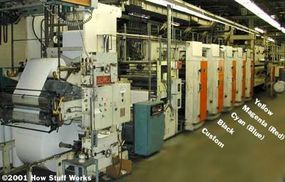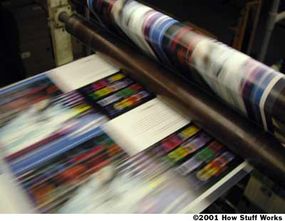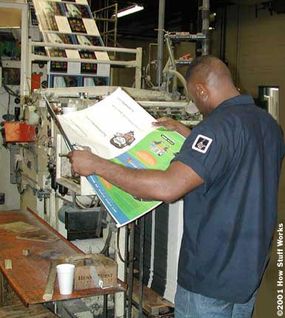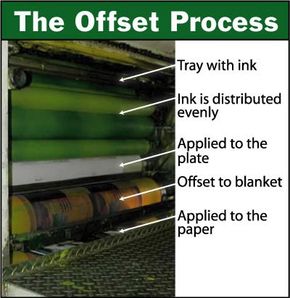The Offset Process
The image area of the plate picks up ink from the ink rollers. The water rollers keep the ink off of the non-image areas of the plate. Each plate then transfers its image to a rubber blanket that in turn transfers the image to the paper. The plate itself does not actually touch the paper -- thus the term "offset" lithography. All of this occurs at an extremely high speed.
The paper is left slightly wet by all of the ink and water being applied. Obviously, there is a risk of the ink smudging. The smudging is avoided by having the paper pass through an oven. The oven is gas fired, and the temperature inside runs at 350 to 400 degrees Fahrenheit (176 to 206 degrees Celsius).
Advertisement
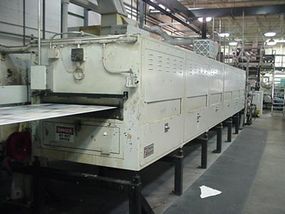
Immediately after leaving the oven, the paper is run through a short series of large metal rollers that have refrigerated water flowing through them. These chill rollers cool the paper down instantly and set the ink into the paper. If this were not done, the ink would rub off on your fingers.
Color and Registration Control
Color and registration control is a process that is aided by the use of computers. Registration is the alignment of the printing plates as they apply their respective color portion of the image that is being printed. If the plates do not line up perfectly, the image will appear out of focus and the color will be wrong. A computer takes a video image of registration marks that have been placed on the press sheet. Each plate has its own individual mark. The computer reads each of these marks and makes adjustments to the position of each plate in order to achieve perfect alignment. All of this occurs many times per second while the press is running at full speed.
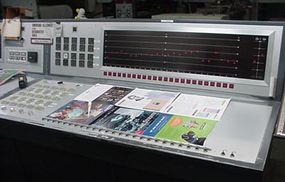
Color control is a process that involves the way in which the ink blends together, and is tied closely to the plate registration. The amount of ink that is released into the units depends on how much ink is needed to achieve a desired look. The ink is adjusted via the control panel that is part of the overall control console. Prior to being placed on the press, the plates are scanned and the data is then transferred to a micro cassette. This serves as the "master" that directs the release of ink to pre-set values.
